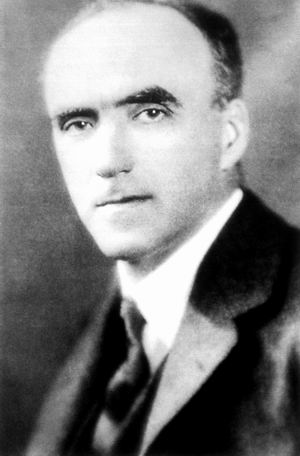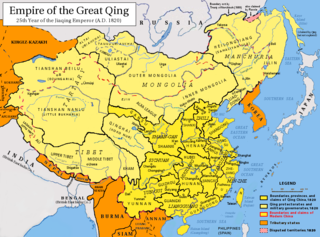Related Research Articles

Pearl Comfort Sydenstricker Buck was an American writer and novelist. She is best known for The Good Earth, the best-selling novel in the United States in 1931 and 1932 and which won her the Pulitzer Prize in 1932. In 1938, Buck became the first American woman to win the Nobel Prize in Literature "for her rich and truly epic descriptions of peasant life in China" and for her "masterpieces", two memoir-biographies of her missionary parents.

John King Fairbank was an American historian of China and United States–China relations. He taught at Harvard University from 1936 until his retirement in 1977. He is credited with building the field of China studies in the United States after World War II with his organizational ability, his mentorship of students, support of fellow scholars, and formulation of basic concepts to be tested.

John Leighton Stuart was a missionary educator, the first President of Yenching University and later United States ambassador to China. He was a towering figure in U.S.-China relations in the first half of the 20th century, a man TIME magazine described as "perhaps the most respected American in China." According to one Chinese historian, "there was no other American of his ilk in the 20th century, one who was as deeply involved in Chinese politics, culture, and education and had such an incredible influence in China."
William C. Kirby is an American historian and sinologist currently serving as T. M. Chang Professor of China Studies and Spangler Family Professor of Business Administration at Harvard University. He is the chairman of the Harvard China Fund, Faculty Chair of the Harvard Center Shanghai, Harvard's first University-wide center located outside the United States, former Director of Fairbank Center for Chinese Studies, former Chair of the History Department and the former Dean of the Harvard Faculty of Arts and Sciences.
Akira Iriye is a Japanese-born American historian and orientalist. He is a historian of diplomatic history, international, and transnational history. He taught at University of Chicago and Harvard University until his retirement in 2005.
Frederic Evans Wakeman Jr. was an American scholar of East Asian history and Professor of History at University of California, Berkeley. He served as president of the American Historical Association and of the Social Science Research Council. Jonathan D. Spence said of Wakeman that he was an evocative writer who chose, "like the novelist he really wanted to be, stories that split into different currents and swept the reader along", adding that he was "quite simply the best modern Chinese historian of the last 30 years".
Elizabeth J. Perry, FBA is an American political scientist specialized in Chinese politics and history. She currently is the Henry Rosovsky Professor of Government at Harvard University. She is a fellow of the American Academy of Arts and Sciences, a corresponding fellow of the British Academy, a recipient of a Guggenheim Fellowship, and served as Director of Harvard's Fairbank Center for East Asian Research from 1999 to 2003 and as president of the Association for Asian Studies in 2007.
Francis Wilson Price, sometimes known as Frank W. Price (1895–1974) was a missionary of the PCUS to China.

Asia was an American magazine that featured reporting about Asia and its people, including the Far East, Southeast Asia, South Asia, and the Middle East. From 1934 to 1946, it was edited by Richard J. Walsh, with extensive contributions from his wife, Pearl S. Buck. Under their influence, the journal published many prominent Asian literary and political figures and American authorities. It was headquartered in Orange, Connecticut. In 1946, after many years of financial trouble, it was merged into a new journal, United Nations World.
Benjamin Isadore Schwartz was an American political scientist and sinologist who wrote on a wide range of topics in Chinese politics and intellectual history.

The tributary system of China, or Cefeng system at its height was a network of loose international relations centered around China which facilitated trade and foreign relations by acknowledging China's hegemonic role within a Sinocentric world order. It involved multiple relationships of trade, military force, diplomacy and ritual. The other states had to send a tributary envoy to China on schedule, who would kowtow to the Chinese emperor as a form of tribute, and acknowledge his superiority and precedence. The other countries followed China's formal ritual in order to keep the peace with the more powerful neighbor and be eligible for diplomatic or military help under certain conditions. Political actors within the tributary system were largely autonomous and in almost all cases virtually independent.
Stephen Owen is an American sinologist specializing in Chinese literature, particularly Tang dynasty poetry and comparative poetics. He taught Chinese literature and comparative literature at Harvard University and is James Bryant Conant University Professor, Emeritus; becoming emeritus before he was one of only 25 Harvard University Professors. He is a member of the American Academy of Arts and Sciences and the American Philosophical Society.
Mary Clabaugh Wright was an American historian and sinologist who specialized in the study of late Qing dynasty and early twentieth century China. She was the first woman to gain tenure in the Faculty of Arts and Sciences at Yale University, and subsequently the first woman to be appointed a full professor in the Faculty of Arts and Sciences at Yale.
Xu Xin is a professor at Nanjing University and China's leading Judaic scholar, as well as the founder and director of the Diane and Guilford Glazer Institute for Jewish and Israel Studies at Nanjing University in Nanjing, China.

Endymion Porter Wilkinson is a British sinologist and diplomat who served as the European Union Ambassador to China and Mongolia from 1994 to 2001. He is particularly noted for Chinese History: A New Manual, the first version of which appeared in 1973, an authoritative guide to Sinology and Chinese history for which he was awarded the Prix Stanislas Julien for 2014. The 2022 revised and enlarged Sixth Edition consists of two volumes, 1.7-million-words, covering topics, primary sources, and scholarship from earliest times to 1976.

Journal of American-East Asian Relations (JAEAR), according to its website, is a "peer-reviewed quarterly journal of interdisciplinary historical, cross-cultural, and social science scholarship from all parts of the world," which began publication in 1992. The scope includes cultural, diplomatic, economic, security relations as well as Asian-American history. Geographical coverage includes the Canada and the United States and East Asia, typically with regards to China, Japan, Korea, and Taiwan along with the academic scope also encompassing the Greater Asia-Pacific region, Australasia, Southeast Asia, and the Russian Far East.
Merle Dorothy Rosenblatt Goldman was an American historian and sinologist of modern China. She was professor of history at Boston University, especially known for a series of studies on the role of intellectuals under the rule of Mao Zedong and on the possibilities for democracy and political rights in present-day China.
East Asia–United States relations covers American relations with the region as a whole, as well as summaries of relations with China, Japan, Korea, Taiwan and smaller places. It includes diplomatic, military, economic, social and cultural ties. The emphasis is on historical developments.
Liu Kwang-ching, who sometimes published under the name K.C. Liu, was a Chinese-born American historian of China. He taught at University of California-Davis from 1963 until his retirement in 1993. He is best known for his scholarship in late-Qing history, astute bibliographical work, and edited volumes, including co-editing Cambridge History of China volumes.
Warren I. Cohen is an American historian specializing in the diplomatic history of the United States. He is Distinguished University Professor, Emeritus, at the University of Maryland, Baltimore County. Cohen formerly served as president of the Society for Historians of American Foreign Relations in 1984.
References
- ↑ Elizabeth Johnston Lipscomb, Frances E. Webb and Peter J. Conn. ed., The Several Worlds of Pearl S. Buck: Essays Presented at a Centennial Symposium, Randolph-Macon Woman's College, March 26–28, 1992. (Westport, CT: Greenwood Press, Contributions in Women's Studies 144, 1994). ISBN 0313291527.
- ↑ Winthrop Knowlton. My First Revolution. (White Plains, NY: EastBridge, 2001; ISBN 1891936018), pp. 6, ff.
- ↑ Reed (2003).
- ↑ "Interview with James Claude Thomson, 1981.” Archived 2010-12-22 at the Wayback Machine 04/21/1981. WGBH Media Library & Archives. Retrieved 3 November 2010.
- ↑ Reed, James (February 2003). "In Memoriam: James C. Thomson Jr". Perspectives. American Historical Association. Retrieved 2006-04-20.
- ↑ How Could Vietnam Happen? An Autopsy
- ↑ Schmalzer, Sigrid (2000). "Review of While China Faced West". Studies of Modern Chinese History: Reviews and Historiographical Essays. University of California, San Diego. Archived from the original on 2006-08-30. Retrieved 2006-09-01.
- ↑ Elizabeth Johnston Lipscomb, Frances E. Webb and Peter J. Conn. ed., The Several Worlds of Pearl S. Buck: Essays Presented at a Centennial Symposium, Randolph-Macon Woman's College, March 26–28, 1992. (Westport, CT: Greenwood Press, Contributions in Women's Studies 144, 1994). ISBN 0313291527.
- ↑ "James C. Thomson". Historical Resources. John F. Kennedy Presidential Library and Museum. Archived from the original on 2006-10-03. Retrieved 2006-04-20.